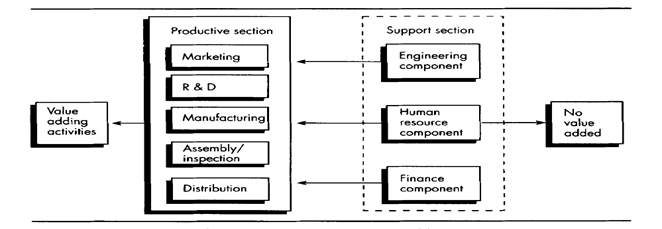SKEDSOFT
Introduction:
Engineering as a specialist profession has been perceived as no more than a support function which is not encouraged to contribute directly in adding value to organisational functions.
The role of engineering in the traditional organisational systems model:

Fig: The role of engineering in the traditional organisational systems model
The model represented in Fig. shows the traditional view o the engineering function as a “on Value Adding’ activity, similar to the role of personnel and finance. These functions have always been described as providing technical/legal/commercial advice and guidance without necessarily being able to influence the decision-making process.
- An enclosure has been deliberately put around the engineering function to keep it as a separate component from the other functions regarded as the lifeblood of organisations.
- This suggests that the partitioning of the various functions and their compartmentalization is not necessarily an infrastructural problem but one more embedded in attitudes and beliefs towards the role of engineering in industry.
- The concerns over the narrowly defined role of engineers and their specialization are widely spread.
- The lessons learnt from the Japanese competitors have drawn attention to the urgent need to produce knowledge workers with organisational awareness of objectives and direction.
- Various terminologies have been used to help redefine the role of engineers, such as ‘an integrated role’ and ‘a systems role’ amongst others.
-
The need to shift away from a narrowly defined role with task oriented objectives towards a more integrated role which contributes towards productivity improvements within organizations, can perhaps be expressed by the following comments.
“Our whole society is based on individualism, specialization and entrepreneurial skills. This impedes our ability to develop an integrated inter-disciplinary team approach dedicated to optimize the whole endeavor, not its specific parts. This requires not only a broad-based technical knowledge but also business, financial and sociological acumen as well.”
’Japanese engineers have a very broad education. It is very much seen as being industry’s business to provide technology specific training. This surely raises the question as to whether the moves in the UK in recent years towards technology specific degree courses might be in totally the wrong direction. Surely we need more engineers with a much broader engineering and general educational background.’